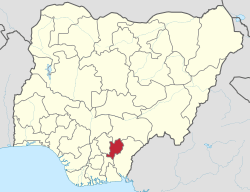Ebonyi State
| Ebonyi | |
|---|---|
| State | |
|
Nickname(s): Salt of the Nation Igbo: Mbà ùmẹ́ ànị̀ | |
 Location of Ebonyi State in Nigeria | |
| Coordinates: 6°15′N 8°05′E / 6.250°N 8.083°ECoordinates: 6°15′N 8°05′E / 6.250°N 8.083°E | |
| Country |
|
| Date created | 1 October 1996 |
| Capital | Abakaliki |
| Government | |
| • Governor (List) | David Nweze Umahi (PDP) |
| Area | |
| • Total | 5,533 km2 (2,136 sq mi) |
| Area rank | 33rd of 36 |
| Population | |
| • Estimate (2005) | 1,739,136 |
| • Rank | 34 of 36 |
| Demonym(s) | Ebonyian |
| GDP (PPP) | |
| • Year | 2007 |
| • Total | $2.73 billion[1] |
| • Per capita | $1,232[1] |
| Time zone | WAT (UTC+01) |
| ISO 3166 code | NG-EB |
Ebonyi is a state in south-east Nigeria. It is inhabited and populated primarily by the Igbo.[2] Its capital and largest city is Abakaliki. Other major townships include Unwana, Afikpo, Onueke, Edda etc. It was one of the six states created in 1996 by the then federal military government. The state of Ebonyi was created from parts of both Enugu State and Abia State. It is home to four Higher institutions of learning: Ebonyi State University, Abakaliki (EBSU); Federal University Ndufu-Alike Ikwo (FUNAI); Akanu Ibiam Federal Polytechnic, Unwana; and Federal College of Agriculture, Ishiagu.[3]
Demographics
There are ten primary dialects spoken in Ebonyi State: Afikpo, Edda, Mgbo, Izzi, Ezza, Ikwo, Kukele, Legbo, Mbembe, Okposi, Uburu and Oring. These dialects are all subgroups of the Igbo language and are commonly spoken throughout south eastern Nigeria.
Administration
In 1999, [Sam Ominyi Egwu) was elected as the first governor of the state under the People's Democratic Party (PDP). He was succeeded by [Martin Elechi] who was elected in 2007 and successfully ran for re-election in 2011, under the same PDP. Gov Martin Elechi was succeeded by the current Governor, Dave Umahi, who was elected in the March 2015 election.
Natural Resources
Ebonyi is primarily an agricultural region. It is a leading producer of rice, yam, potatoes, maize, beans, and cassava in Nigeria.[4] Rice and yams are predominantly cultivated in Edda, a region within the state.[4] Ebonyi has several solid mineral resources, including lead, crude oil, and natural gas, but few large-scale commercial mining|mines. The state government has, however, given several incentives to investors in the agro-allied sector to encourage production. Ebonyi is called "the salt of the nation" for its huge salt deposit at the Okposi and Uburu Salt Lakes.[4]
Local Government Areas
Ebonyi State consists of thirteen (13) Local Government Areas. They are:
See also
References
- 1 2 "C-GIDD (Canback Global Income Distribution Database)". Canback Dangel. Retrieved 20 August 2008.
- ↑ http://www.faculty.ucr.edu/~legneref/igbo/igbo2.htm
- ↑ "Federal College of Agriculture, Ishiagu". FECAI, Ishiagu. Retrieved 20 March 2014.
- 1 2 3 "[Ebonyi Online - About Ebonyi State